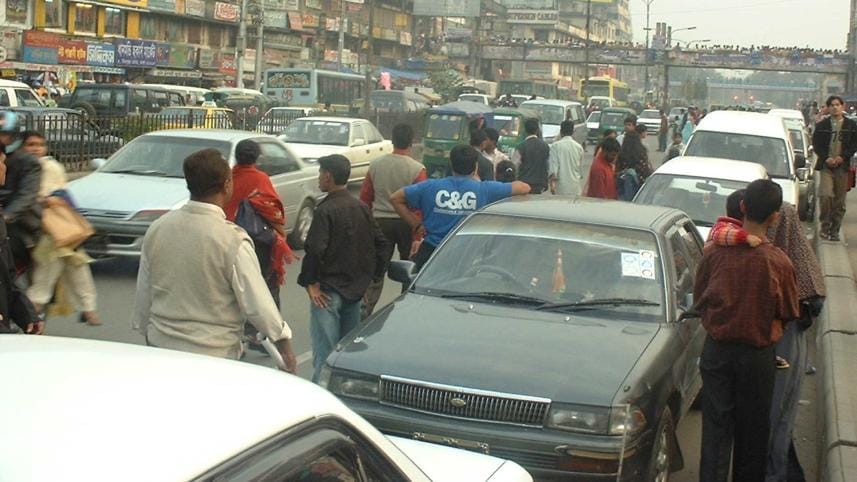Learning to value people, not cars

Imagine if aliens came to Earth. If they landed in just about any major city, they would be forgiven for believing that people are simply batteries for automobiles, and that automobiles are the true life form, with everything designed around their needs for housing, fuel, and socialising with other automobiles on congested streets.
If the aliens were to land in Dhaka, they would undoubtedly conclude that whatever the dominant life form is, it is extremely fond of pollution, congestion, noise, and danger. Why else would someone design a city in a way to maximise them all?
If, however, the aliens had the good fortune to drop in during a World Car-Free Day celebration, they might get a vastly different impression. Ah! People, not cars, are the major life form. People are joyous, sociable creatures who enjoy interactions outdoors in a convivial and safe environment. They respect the rights of people on foot and on bicycles to move about safely. Rather than forcing people to the margins, they assign automobiles to that unenviable spot.
Around the world, countless cities—including Dhaka—celebrate World Car-Free Day on September 22 every year. This day serves as a useful reminder that the automobile was meant to serve us, not vice versa.
We pour our money into vehicles and the infrastructure to serve them. We lose blood and limbs in the inevitable crashes that occur when people operate heavy vehicles at a speed more than 30km/hour. We accept that we will breathe filthy air, and that millions of people worldwide will die prematurely each year from air pollution. We prioritise the rights of cars over the rights of people. And what do we get in return? Endless congestion and ugly, unliveable cities.
None of that is inevitable. People have lived in cities for thousands of years; automobiles are a recent entrant. Given all the disasters they have wreaked, it is well past the time to consider whether allowing, nay, inviting them into our cities was a wise choice.
There is a saying that if we aspired to make our cities polluted, dangerous, and congested, we could hardly have chosen a better way than to make them auto-centric. If, on the other hand, we wish to have cleaner air, safer streets, easier travel, and more active, happy residents, then we should make major changes. Those changes involve both a carrot and a stick. The carrot is in making better transport options—walking, cycling, rickshaws, and public transit—attractive, convenient, and affordable. The stick involves making trips by cars (and motorbikes) more cumbersome and expensive, by not allowing them everywhere and by charging both for the time and space occupied when they are parked.
In our globalised world, it is easy to see the results of different approaches. Car-centric cities around the world are congested, polluted, and dangerous. Cities that reward people for moving about without a car are vastly more pleasant.
It will not be easy to break the stronghold that the three-headed monster—car, fuel, and road construction companies—has over our governments. All of us are, to some degree, susceptible to the propaganda they put out, genuinely believing that modernity means cars, and that pollution, congestion, and crashes are inevitable. But we can work to liberate ourselves and our governments from the monster's malevolent influence. We can demand that the rights of children to walk and cycle safely to school, and for adults to commute safely and conveniently without a car, should take precedence over the "right" of people to drive and park.
We can make our demands clear through our actions and words. We can learn more about urban planning and transport, and how they play out in different cities. How some cities are striving to become "15-minute cities" where everything important is within a 15-minute walk or bicycle ride of residences. How some cities have started to convert roads for cars into bicycle avenues, or to convert road space on weekends temporarily into a space for lively, fun social gatherings, during the Covid-19 pandemic and beyond.
Most important of all, we can dare to believe in, dream of, and work for something infinitely better than the polluted, car-centric cities that our alien visitors will otherwise discover.
Debra Efroymson is executive director of the Institute of Wellbeing, Bangladesh, and author of "Beyond Apologies, Defining and Achieving an Economics of Wellbeing."




 For all latest news, follow The Daily Star's Google News channel.
For all latest news, follow The Daily Star's Google News channel.
Comments